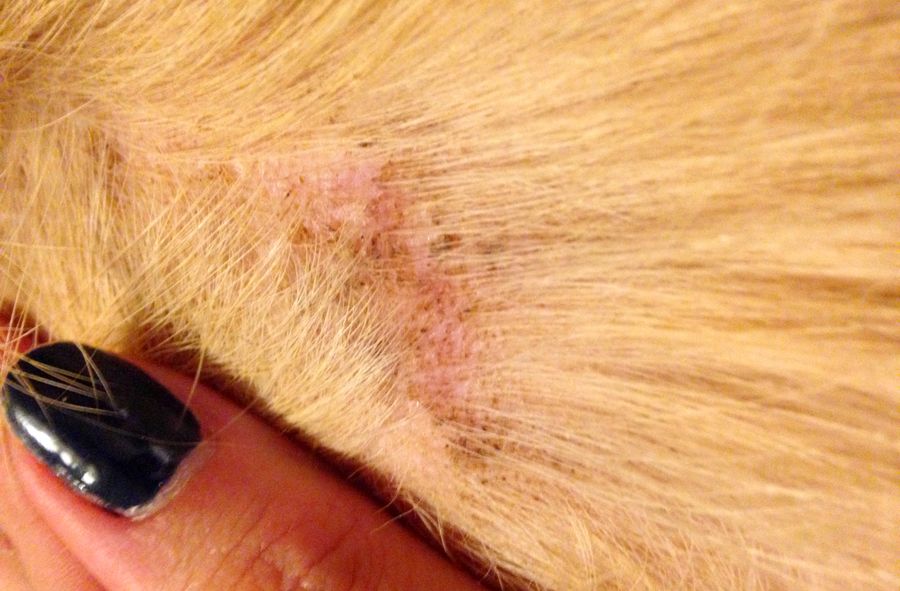Dog Eczema
In this article, we will study what eczema is. It is important to know that eczema is not a disease but the consequence or symptom of a disease.
We will first look at the diseases that can cause eczema, their symptoms and their treatment. Then we will finish by seeing that it is possible to avoid that our dog catches eczema and thus preserve its good health.
What is eczema?
Eczema is an inflammation of the skin due to a disease. It is not in itself a disease but a symptom. There are several causes of eczema.
There are three types of eczema: allergic or food eczema, chronic eczema and atopic eczema.
What diseases can cause eczema?
Flea infestation can cause eczema: it is important to know that flea saliva is very irritating. Most dogs will not react more than that to a flea bite, but some are allergic to it. In this case, the flea bite will cause what is called FAD (Flea Allergy Dermatitis). This dermatitis will cause significant itching.
The main symptoms will be: an important pruritus often met in the zones of the neck, dorsolumbar, of the base of the tail or on the abdomen, it will be possible to find traces in the places of the puncture (small red points). The main goal of the treatment will be to eliminate fleas from your pet and its environment.
It is therefore essential that you treat the places where your dog goes with a suitable product. Of course, it will also be necessary to treat your companion with adapted antiparasitics (collars, tablets, pipettes, sprays, shampoos, fumigants).
Tick infestation: tick bites can also cause dermatitis with pruritus at the site of the bite. It will be important in case of a bite to remove the tick as soon as possible with a tick hook and then to disinfect the bite site with betadine.
The main treatment will be to protect your animal with an adapted antiparasitic. The goal will be to kill the tick before it reaches the skin of your dog and bites him. You will therefore need an adapted insecticide.
Sarcoptic mange: this form of mange is caused by a mite. Animals can transmit it by direct or indirect contact (blankets, kennels, bowls...). The symptoms will be mainly a significant hair loss that will spread more and more (the most affected areas are the head, the inside of the thighs and the belly), a very important pruritus aggravated by the heat.
The treatment will consist of isolating the animal since it is very contagious and then treating the scabies locally with acaricides. Other less common parasites can cause eczema such as canine demodecia. Dermatomycoses can also be responsible for eczema. These are skin problems caused by fungi such as ringworm or yeast infections.

Other cause
Food allergies
Some dogs are more sensitive than others to certain foods. It often happens that by changing the food (you didn't have enough kibble, or you wanted to give your dog a new taste to please him), skin problems and especially eczema appear. Indeed, a too fatty food or a deficiency in vitamins due to a bad food can accentuate the eczema.
Chronic eczema
This type of eczema lives up to its name. Usually, eczema has been around for some time and then flares up from time to time. It is usually found in older dogs that tend to stop exercising or are overfed. The main symptom will be redness and intense itching.
Atopic eczema
This type of eczema is usually genetic. It is necessary to know that certain races of dogs are predisposed to the atopic eczema. We find in particular the boxers, the bulldogs, the sharpeis... Here also the main symptom will be redness and itching.
How is eczema diagnosed?
If you notice skin lesions, redness or itching, it is important to go see your veterinarian. Indeed, at first, he will ask you many questions in order to try to target the cause of the eczema.
It is possible that he will have to do what is called "scratching". In general, the scraping is done with a scalpel blade. The goal is to collect some skin flakes in order to analyze them under the microscope or to have them analyzed in a specialized laboratory. This examination is absolutely not painful for your pet.
What are the treatments for eczema?
It is important to find the cause of the eczema so that the veterinarian can give you a suitable treatment. Generally, the treatments are in the form of lotion, shampoo, ointment. For each cause, a solution will be proposed.
It is therefore important not to self-medicate because you could make the problem worse if the product you use is not adapted. If your dog is so itchy that it hurts itself, you can take the initiative to put a collar on it.

Can all dogs be cured of eczema?
In the case of eczema due to an allergenic agent, whether food or parasite, it is very well cured with the appropriate treatment. On the other hand, in the case of eczema due to a genetic factor, it is impossible to solve the cause of the eczema, so it will not be completely curable.
The veterinarian will be able to relieve your pet, but your companion may have skin problems all his life. However, there are simple ways to relieve your pet and even prevent eczema from flaring up: an adapted diet and a healthy lifestyle.
It is also possible to relieve your pet with natural products. Natural products will mainly aim to minimize the side effects of the treatments given. Indeed, some treatments can be heavy to bear on the liver or kidneys.
The natural treatments will clean these organs and avoid an attack especially for dogs with chronic eczema and who will therefore have to have treatments regularly.
Can dog eczema be transmitted to humans?
Most dermatoses are not transmissible to humans, especially in cases of eczema due to an allergy. The main risk is that your pet brings home a parasite such as a flea or tick. These can cause skin lesions in humans if bitten.
So if your dog has an eczema problem and you start scratching at the same time, go to your doctor, you may have been bitten by fleas. In case of tick bites, it is even more important to consult a doctor because ticks can transmit serious diseases.
Some eczema can also be caused by fungi such as ringworm and can be transmitted to humans. If the veterinarian diagnoses a fungus in your dog and lesions appear on your body, consult a doctor as well.
How to prevent eczema in dogs?
Hygiene will be an important point to fight against eczema especially when the cause is parasitic. It is essential to regularly clean sleeping areas and kennels. It is also necessary to regularly protect your pet against external parasites (fleas and ticks).
In case of infestation, treat your environment. In hot weather, or after swimming in a lake or in the sea, wash your dog with a suitable shampoo. It is important to avoid using our shampoos on dogs because they have a PH too aggressive for the skin of our companions.
An adapted diet: as for us, a good diet is the basis of good health. Your dog grows and ages, so it is important to adapt his food to each phase of his life. When your dog gets older, it is important to change his diet because he will move less and will need a lower fat diet.
Continue to be physically active: your pet is certainly getting older, but this is not a reason to stop all physical activities. You can reduce the amount of time spent walking your pet and the difficulty of the activity, but it is important to continue to walk your pet regularly to avoid the risk of obesity and possible skin problems caused by a sedentary lifestyle.
Loving and educating your pet also means protecting it against the hazards of life. This is why we strongly recommend that you take out health insurance as soon as possible. This will save you astronomical veterinary fees in case of accident or illness.


